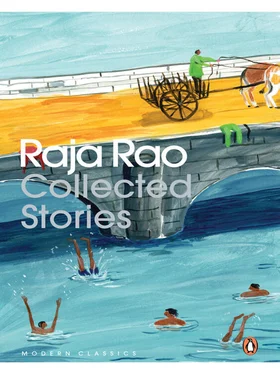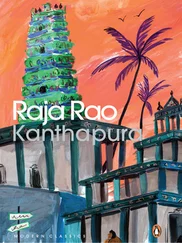Raja Rao - Collected Stories
Здесь есть возможность читать онлайн «Raja Rao - Collected Stories» весь текст электронной книги совершенно бесплатно (целиком полную версию без сокращений). В некоторых случаях можно слушать аудио, скачать через торрент в формате fb2 и присутствует краткое содержание. Год выпуска: 2014, Издательство: Penguin, Жанр: Классическая проза, на английском языке. Описание произведения, (предисловие) а так же отзывы посетителей доступны на портале библиотеки ЛибКат.
- Название:Collected Stories
- Автор:
- Издательство:Penguin
- Жанр:
- Год:2014
- ISBN:нет данных
- Рейтинг книги:5 / 5. Голосов: 1
-
Избранное:Добавить в избранное
- Отзывы:
-
Ваша оценка:
- 100
- 1
- 2
- 3
- 4
- 5
Collected Stories: краткое содержание, описание и аннотация
Предлагаем к чтению аннотацию, описание, краткое содержание или предисловие (зависит от того, что написал сам автор книги «Collected Stories»). Если вы не нашли необходимую информацию о книге — напишите в комментариях, мы постараемся отыскать её.
Collected Stories — читать онлайн бесплатно полную книгу (весь текст) целиком
Ниже представлен текст книги, разбитый по страницам. Система сохранения места последней прочитанной страницы, позволяет с удобством читать онлайн бесплатно книгу «Collected Stories», без необходимости каждый раз заново искать на чём Вы остановились. Поставьте закладку, и сможете в любой момент перейти на страницу, на которой закончили чтение.
Интервал:
Закладка:
Bhola comes back, and with the grace of Mother Ganga, he returned just as he had gone. The dark waters had given him no roughness nor did he drink. He talked of Rama and Sita, even more so now. And he always talked of Pandit Vishwanath. Bhola never told a lie. He joined the wheelwright work, and now that cars began to be made in this country, people heard of him here — they heard of him there — and he became a motor mechanic to the zamindar families of Ghazipur. Sometimes at a grand marriage they would even ask him to drive a car for the nuptial procession (there were not so many car drivers either in those days) and often Bhola could even tame a rutting elephant (he had learnt this from an Elephant-merchant at Sonapur fair), with half a bucket of prithi grass-juice for the stomach and chilli puttie s pasted on the forehead. His fame spread, but you always heard him repeating some mantra. And three years after his arrival his wife’s girth showed roundness, and in a few months a baby boy was indeed born to Bholanath. Life is so simple: God gives when He gives. For the rest man has to say his mantras assiduously, eat good food, sleep, wake and work. Since the Lord gave the child, Bholanath called the boy Vishwanath because that was the name of his teacher in Flanders, and also, of course, of Shiva in Benares. And soon Bhola put the household bulls to the yoke and with grandmother, mother, and the child, ringing the bells, the cart sped towards holy Benares.
What happened after that Bholanath will not tell you. He will turn towards his Guru and smile. And the Guru (whom you now realize to be Vishwanathji) says in grave benignance: ‘Well, who knows, sir, the ways of the Lord!’ Bholanath had come to Benares with his family, and no sooner they arrived at the sacred city than a virulent epidemic of cholera broke out. The mother and the wife died almost the same day. The child lived three days further, and it sank too in his arms to death. Bhola came to the river with this little body in his arm— it was night and he wanted to let the child float down, a gift to the Ganges, ‘let mother Ganga who gave him to us, take him too,’ he wanted to say. But God intervened as he always does for a devotee in distress. Vishwanathji himself appeared. ‘I was there,’ explains Vishwanathji to any pilgrim who wants to hear the story, ‘I was there, seated on the Dashashwamedha Ghat. I had just come from Calcutta having resigned my job. I had been a clerk at the Patent Office. My train came at eight o’clock (she was late by four hours) and after throwing in my luggage at a dharmasala, I rushed to Mother Ganga. I took my bath in the holy river, and sat on the steps of the ghats. As I sat contemplating her, I recognized Bhola at once, the dead child in Bhola’s arms, and a full moon on the heavens. I stopped him from giving the child to the Ganga. I bought firewood and had the child duly burnt. That’s the way to really deal with the dead and once for all, so. And,’ concluded Vishwanathji, ‘Bhola never went back to Rajgarh.’
The Sadhu gives you a loving smile. ‘Then I took on the ochre, and Bhola continued to stay with me. He goes to work at the Imperial Motor Works — Bhola patches a tyre or twists a plug, he’s magical with the machine. And the car purrs and darts off. He gets well paid for it. He brings me rice and vegetables and firewood,’ says the Sadhu, gently patting his thighs. ‘He looks after me out, and I look after him in.’
Bhola, his fingers covered with foulest grease, hides his face with his large quiet hands. ‘I’m no one to look after anyone. The great Vishwanath high up there looks after everyone in the world, and this Vishwanath here looks after me.’
‘But, Bholanath, you mean you will end your days, like this, on the Ganga Ghat?’
‘As Dadu says, “Home is Ganga Ghat for he who’s even once the Ganga hath seen. Never a home be a home where Mother Ganga floweth by not.”’
‘But you are not very old yet. Why this thin-limbed asceticism?’
‘Man lives for happiness, as Vishwanathji says. And if happiness is on the Ganga I say take it, eat it, be submerged in it, as you’re with the Ganga. Sometimes when the red dawn breaks on the Ganga, I cannot bear the veiled white silence over the river — it brings tears to my eyes. I do not know why, but never for father or mother have I wept as I do for the Ganga— this Ganga is my father, this Ganga is my mother. I’ve seen the world and its ways, I’ve seen the wars of the Redman, the glory of Rome, the gaiety of Paris. For me, the service of my Guru comes first. And what could be of deeper worth than performing the services of the Guru on the Ganga Ghat. I tell you brother: Never is there greater joy for man than that his Guru and his Ganga be side by side. Hé, hara-hara Shambho.’
And Bholanath lights his hookah, and looks sadly at the world. A monkey is picking the lice off her neighbour. Some middle-aged widow is slipping into the Ganga for her bath. She has strong limbs but her sparse hair is white. The children are teasing an old woman seated on the Ganga, a cloth bundle beside her: ‘Hé, hé, where’s your husband?’ ‘And how many teeth have you in your mouth?’ ‘Thirty-two,’ says another. And they all burst into laughter. Bholanath rushes towards the boys, a fuel stick in hand, and frightens them away. And as a funeral is coming, Bholanath goes over and drives off the crows and the vultures from the pyre-platform. If there’s one nuisance in a Benares death, it’s the crows. And every crow is not a Kakabhusundi.
You can now see Bhola’s Guru light his oven and put a lid on the cooking vessel, and while Bhola keeps the monkeys away, the Guru slips into the water for his midday bath. He who has not slipped into the Ganges and felt the lightness of the Ganges knows not water. You plunge and plunge again into the Ganga. And you are suddenly aware of a fragrance of holiness and the touch of a deep white truth. And when you spit that water out, how your belly gurgles in happiness.
When the Guru returns, Bhola goes down the ghat. Bhola will now sit, a pipal twig in hand, his left leg in the water, his head resting on the other knee, doodling away on the steps of the ghat. He goes drawing a triangle first, and then dipping the twig in the Ganga brings it back quickly surrounding the triangle with a circle, and rubbing it away, starts all over again.
‘What’s that, Bhola,’ I ask.
‘Birth, marriage and death — my story has three parts, and here,’ he says drawing the circle round around the triangle, ‘is God.’
‘You were born a wheelwright. .,’ I start saying.
‘Yes, yes,’ he interrupts, ‘yes, you see, God himself is a potter. He made the wheel from which came this pot,’ and he laughs, beating his chest with dire conviction. ‘Brother, all ends in a circle,’ he repeats and throws a stone to drive away a crow, and hop-hop it disappears. Then dipping the twig into the Ganga he makes the triangle and the circle again. ‘Till the triangle become the circle, you see, God will not be pleased.’ And then he sits cross-legged, murmuring to himself:
Agar Gangaji na kahé to
Kon japéga Ram,
Agar mein na kahé to,
Tuhi rahéga Ram (!)
If the Ganga does not say
Who then will go on naming Ram,
If I do not say (!)
You alone will remain, O Ram.
VIII
‘Palki, Palki,’ the whisk-bearer would shout, running reverentially through the squeezing-in, stony tumbling-forth lane, ‘Palki, Palki, the Palki of Rani Rasomani. Hé, make way, make way, ye strangers,’ and the head palanquin bearer, red-turban, and silver bangle on left arm, will sing,
The parrot has no teeth
The hen no crown
The fig hath no flower
Nor the river a back-going step.
Читать дальшеИнтервал:
Закладка:
Похожие книги на «Collected Stories»
Представляем Вашему вниманию похожие книги на «Collected Stories» списком для выбора. Мы отобрали схожую по названию и смыслу литературу в надежде предоставить читателям больше вариантов отыскать новые, интересные, ещё непрочитанные произведения.
Обсуждение, отзывы о книге «Collected Stories» и просто собственные мнения читателей. Оставьте ваши комментарии, напишите, что Вы думаете о произведении, его смысле или главных героях. Укажите что конкретно понравилось, а что нет, и почему Вы так считаете.












